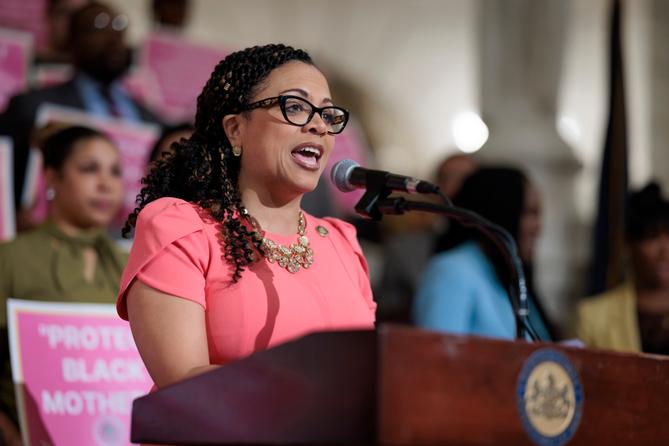Gov. Josh Shapiro signed two bills into law this month to address maternal health care and wellness.
One of the new laws creates a statewide public awareness campaign about postpartum depression. The other enacts into statute a Pennsylvania Department of Human Services policy that gives doulas — or nonmedical workers who provide support to pregnant people — a path to seek Medicaid reimbursement. This would help expand access to their services.
How We Care spoke with state Rep. Gina Curry (D., Delaware) about the legislation. She co-chairs the Black Maternal Health Caucus, which supported the bills as part of a “Momnibus” package aimed at improving care for parents.
In this interview, which has been edited for length and clarity, Curry, a mother of three, talks about the bills that did — and didn’t — make it to Shapiro’s desk and how she feels the government can better support families.
Spotlight PA: How does being a mom fit into your life while also being a legislator? Is it difficult to balance the two?
Rep. Gina Curry: Balance is something that I wake up every day, and really ask the good Lord to help with. Because in my recent journey of becoming a widow last year, now I have a huge responsibility of being a single mom … But I have a good village around me that helps me. It's helping me to navigate this new space and get the work done for the people in the commonwealth, and also making my family a priority.
You bring up the idea of there being a village to help raise a kid. Do you think it is important for the government to be part of that village, so to speak?
I absolutely do. Government has a role in making sure that the communities that we serve are in good spaces to be able to raise families and do the things that they can for their families.
When you have 107 deaths in a maternal mortality and co-morbidity report [Editor’s note: this report covers deaths from 2020.], that is too many. Way too many. Those numbers, we need to see them coming down. Just to give you this last statistic: 92% of these births, these experiences of women dying from maternal mortality … can be prevented.
So the legislation, the Momnibus, the strategic planning coming out of the governor's office, with the Departments of Health, Drug and Alcohol, and Human Services — these are all collaborative efforts that we are making to make sure we don't have these high numbers in the state of Pennsylvania or throughout this nation. It's unacceptable.
Caregiving, helping moms — it feels like something that is hard to oppose, and everyone probably wants to say they support it. But not all the bills have passed. You had to make some changes to get the postpartum bill to the governor's desk. Do you think there's a future for the rest of the bills?
I would love to see the next bill to go through [to be] the blood pressure cuffs. [Editor’s note: One bill would require insurance coverage for at-home blood pressure monitors related to pregnancy care, while another applies to Medicaid.]
People don't even know when their blood pressure is skyrocketing after you've had a baby. You don't know how dangerous it is, because at that point in the game, you're worried about your infant, you're not worried about yourself. You're worried about … getting what the infant needs versus what mom's getting. And so mom oftentimes may have a headache, they might not be feeling great, but they're just chalking it up to the fact that they're a new mom. Blood pressure cuffs give them a chance to monitor their own health every day. If they see those numbers going up, with education from their OBGYN and their pediatrician, these are great ways to help women stay healthy after birth.
Why is it so hard to get agreement on providing resources or support — whether it's requiring insurers to cover something or having Medicaid pay for something — when I think there's so much agreement to support childbearing?
In looking at the cost of things, that's always a concern. Funding is always a concern. Folks are like, “How much is this going to cost?”
Every woman leaving the hospital should have a baby box. [Editor’s note: Curry has co-sponsored a bill that would provide such boxes.] One of the biggest gifts that I give is called a postpartum box at a baby shower. I think it cost about, I want to say $65 … And I love that gift. And every mama just calls me back and says that was so great, because it has the things in there that are necessary.
We had a whole major argument on the floor, I remember it, about, “Everyone doesn't need that.” No, every woman does need it. And even if you have the funds to afford it, it's something that should be in your baby bag as you leave. There's a lot of things that happen to women after birth, and we need to be able to have them prepared not to go into a situation that could potentially cost their lives. When you talk about a partisan hang-up, I think we've gotten to spaces in our committee meetings where we're making folks understand and really listen and think about how we can come to a middle ground.
